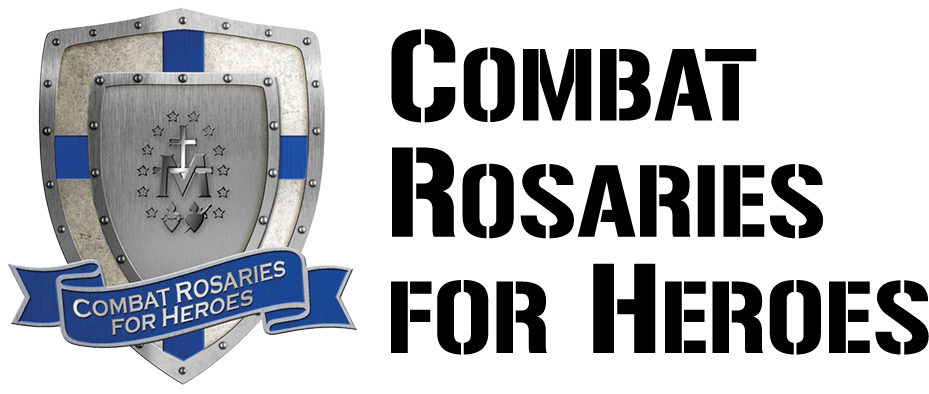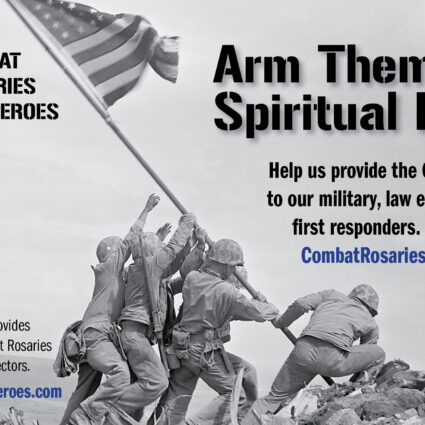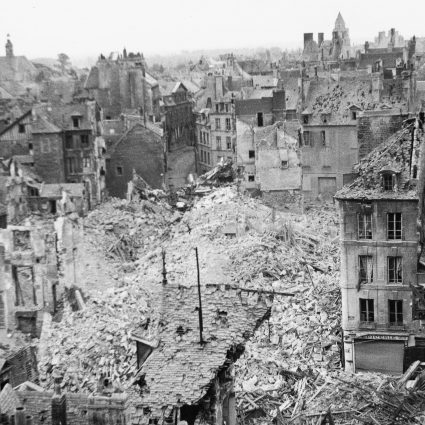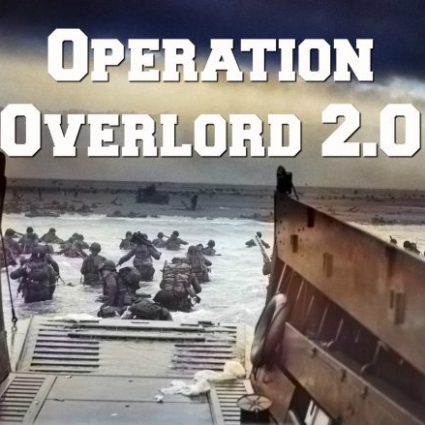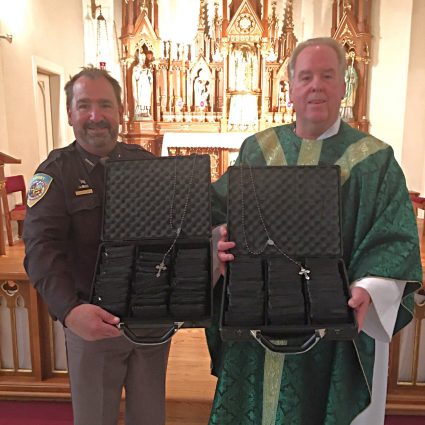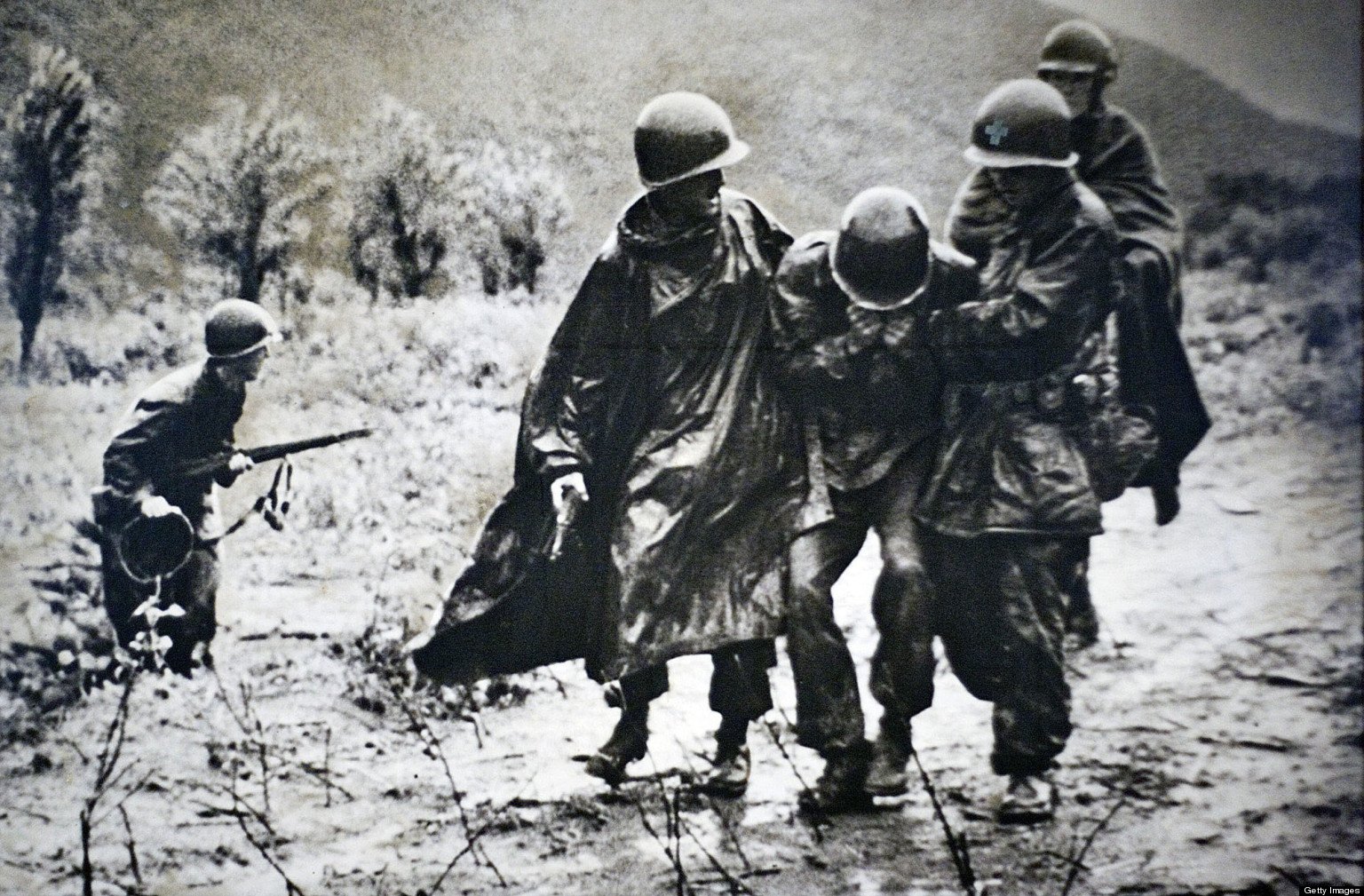
Capodanno and Kapaun: Heroic Priest-Chaplains on the Battlefield
Two priests who well understood the power of and comfort prayer on the front lines were Servant of God Fr. Vincent Capodanno and Fr. Emil Kapaun, who brought the sacraments and the Rosary to U.S. military units in World War II, the Korean War and the Vietnam War. These priest-chaplains embodied courage under fire and sanctity on the battlefield.
Although his U.S. Navy chaplain duties didn’t require him to be at the front, Fr. Capodanno went wherever the Marines under his care were. The Marines naturally gravitated to the priest. One moment Fr. Capodanno would be quietly praying the Rosary by himself and minutes later he was surrounded by Marines joining in prayer. The men quickly figured out how much their priest cared for them.
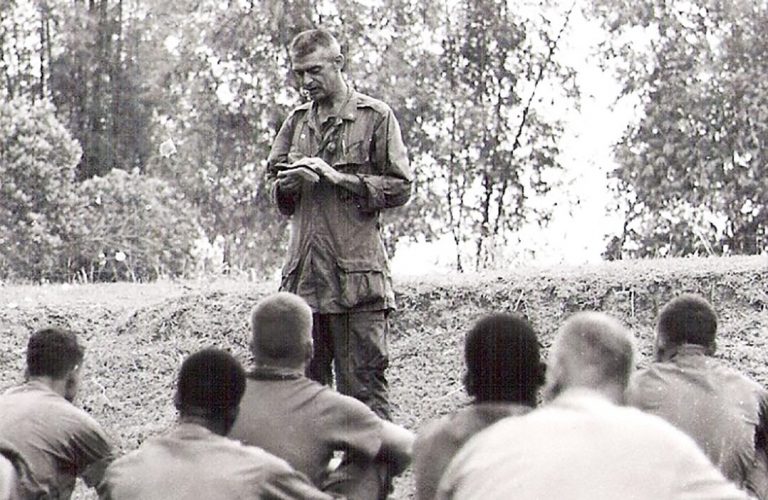
“Wherever the Marines were, Father Capodanno was there, in the water or in mud up to his knees,” said a Marine who served with him in Vietnam. Just three weeks after being assigned to the 3rd Battalion of the 5th U.S. Marine Regiment, Fr. Capodanno voluntarily put himself in the middle of a firefight in the Que Son Valley. Hunkered down in a shell crater, Fr. Capodanno followed a medic onto the battlefield, moving among the fallen to anoint the dying and comfort the injured.
An enemy mortar badly mangled his right arm and hand, yet Fr. Capodanno continued attending to his men. As he moved from one fallen Marine to another, he was struck by a machine-gun blast that pierced his body from the head down to his torso. He died where he fell on Sept. 3, 1967. He was 38.
George Phillips of 1st Platoon says Fr. Capodanno “had an innate ability to know when Marines needed to talk about something. And he would sit and wait in silence until the Marine was ready to talk [and] never move on until he saw the Marine had received some comfort,” Phillips said in a 2020 story in Catholic World Report. “But when you … were talking with him, it was like the two of you were in a cocoon.”
For intrepidity and conspicuous gallantry, Lt. Vincent R. Capodanno was awarded the Medal of Honor. In May 2006, the Archdiocese for the Military Services U.S.A. opened the cause for beatification and canonization of Fr. Capodanno. This included designation of Fr. Capodanno as a Servant of God for his life of heroic virtue.
Wherever the Marines were, Father Capodanno was there, in the water or in mud up to his knees
Just a few years out of the seminary, Fr. Emil Kapaun enlisted in the Army Chaplain Corps in 1944 and served in India and the Burma theater at the end of World War II. He quickly developed a reputation as a real soldier’s chaplain.
“At that time, most of the fighting was over, but they said there would be pockets of resistance where they would hear gunfire,” said the Rev. John Hotze, vicar general of the Diocese of Wichita, where Fr. Kapaun was incardinated. “It was kind of a bet among the men as to how quickly Kapaun would be able to get to where the shooting was, because he felt that was where the men needed him.”
Kapaun was promoted to captain in 1946 and left the service. That hiatus did not last long, as Fr. Kapaun felt the call to serve again. He was stationed in Japan when the Korean War broke out. His unit, the 8th Cavalry Regiment, 1st Cavalry Division, was sent to Pohang, South Korea as part of the first wave of reinforcements.
On Aug. 2, 1950, Fr. Kapaun earned a Bronze Star for dragging wounded soldiers to safety under enemy fire. He described the perils in a letter home.
“My pipe got wrecked again as a Red machine gunner sprayed us with lead and we had to hit the ditch,” Kapaun wrote in October 1950. “It is funny how a fellow can jump so fast into a ditch. This time it did not have water in it. The last time, the ditch had water in it and you can imagine how we looked. We do have a few laughs in spite of the evils of war.”
On Nov. 1 and 2, 1950, Fr. Kapaun helped safely gather 30 soldiers after his unit’s command post was attacked by Chinese commandos. He repeatedly rescued men under enemy fire and brought them to the safety of a dugout. When they were totally surrounded by the enemy, Fr. Kapaun convinced an injured Chinese officer to negotiate on their behalf. The group was taken prisoner.
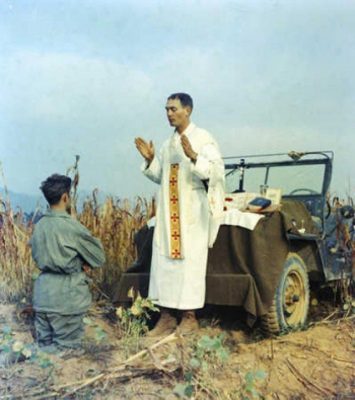
Kapaun’s bravery those two days earned him the Distinguished Service Cross, which was posthumously upgraded to the Medal of Honor in 2013. In the Pyoktong prison camp, Fr. Kapaun tended to his men’s physical and spiritual needs. Many nights he snuck out of his mud hut and dodged the guards so he could visit the enlisted men.
“He was helping other POWs and especially the POWs who were sick and wounded,” a fellow U.S. Army officer said. “He would try to wash their clothing for them, he would clean the prisoners up, he would help pick lice off of their bodies, and he would go around and he would conduct religious services. And it did not matter whether you were Catholic or whether you were Protestant, everybody was welcome to these services.”
Kapaun blessed his captors as they carried him off to the “death house,” which the Chinese claimed was a hospital. He died on May 6, 1951 from starvation and malnutrition. Because of his life of heroic virtue, the Catholic Church declared Fr. Kapaun a Servant of God in 1993 and a cause for his sainthood was opened. His family received his Medal of Honor in a special ceremony at the White House in April 2013. •
- To learn more about Fr. Vincent R. Capodanno, visit the Father Capodanno Guild
- Read more about Fr. Emil Kapaun in his U.S. Army biography
Image, top: Father Emil Kapaun helps a wounded soldier to safety. Fr. Kapaun served as a chaplain in World War II and the Korean War.
